
The U.S. is continuing to blow up boats in the Caribbean and the Pacific despite growing international condemnation, while the Trump administration reportedly considers launching airstrikes on Venezuela or even assassinating President Nicolás Maduro.
“We are committing wanton criminal acts of assassination in the Caribbean [against] innocent people who haven’t been found guilty of anything, and kind of setting the stage for an attack on Caracas itself in an attempt to take out its leader,” says Peter Kornbluh, a senior analyst at the National Security Archive.
Kornbluh also discusses the legacy of the Church Committee 50 years ago, which investigated abuses by U.S. intelligence agencies, including coups and assassinations abroad.
Transcript
AMY GOODMAN: This is Democracy Now!, democracynow.org, The War and Peace Report. I’m Amy Goodman.
The U.S. is continuing to blow up boats in the Caribbean and Pacific, despite growing international condemnation. On Thursday, Defense Secretary Pete Hegseth announced the U.S. had struck a boat in the Caribbean, killing three people. He alleged they were narcotraffickers, but once again offered no proof. U.N. human rights chief Volker Türk recently denounced the U.S. extrajudicial killings. In recent months, the U.S. has blown up 17 boats and one submarine.
This comes as The New York Times reports the Trump administration is considering launching airstrikes on Venezuela or even assassinating the Venezuelan President Nicolás Maduro. The Times reports one idea floated involves the U.S. sending Army’s Delta Force or the Navy SEAL Team 6 to try to capture or kill Maduro.
We’re joined right now by Peter Kornbluh, senior analyst at the National Security Archive, co-author of a new piece in The Nation headlined “Trump’s Gunboat Diplomacy” and another piece in Foreign Policy headlined “With Military Buildup Against Venezuela, the U.S. Eyes Cuba as Well.”
Peter Kornbluh, welcome back to Democracy Now! It’s great to have you in the studio. Let’s talk about the U.S. — I mean, this New York Times exposé. You also wrote about it, the U.S. intention to assassinate another president of another country.
PETER KORNBLUH: That’s right. It’s one of the most extraordinary kind of open discussions of assassinating a foreign leader that I think we’ve ever experienced. It comes 50 years this month after the Church Committee, the famous Senate committee, went ahead and exposed the reality that the CIA had been going around trying to assassinate foreign leaders. And at that point, it was a scandal, 50 years ago. And today we have a situation where, openly, the president of the United States and his team are trying to come up with a legal rationale for basically neutralizing, liquidating, assassinating a foreign leader, in this case, Nicolás Maduro of Venezuela. And it’s an extraordinary turn of circumstances. It’s something we have to talk about. The cynical interpretation of the murder of these boat crews in the Caribbean is basically that the Trump administration is sending a signal to Maduro that he is next. And we are committing wanton criminal acts of assassination in the Caribbean, innocent people, who haven’t been found guilty of anything, and kind of setting the stage for an attack on Caracas itself in an attempt to take out its leader.
AMY GOODMAN: You write in the Foreign Policy piece about the military buildup against Venezuela, “With 10 naval vessels and 10,000 troops already deployed to the Caribbean — the largest military buildup there since the 1962 Cuban missile crisis — and a carrier strike group led by the USS Gerald R. Ford taking up position.” Talk about the significance of the USS Gerald R. Ford.
PETER KORNBLUH: The USS Gerald R. Ford is the biggest aircraft carrier, most modern aircraft carrier in the world. It is described as the most lethal combat platform in the U.S. military. It is currently arriving in the Caribbean in the next three or four days to take up a position, along with another 10 battleships that are already there. The USS Gerald Ford carries 5,000 Marines and seamen. It already is going to augment the military force that’s in the region by another 10,000, so it will be 15,000 U.S. military personnel aimed at Venezuela.
So this is a crisis. It’s a crisis for Latin America. It’s a crisis for the American people, because there has been no provocation here. Venezuela has not threatened the United States. It has not attacked the United States. We have a preemptive effort by the president of the United States to kind of renew the old era of gunboat diplomacy and simply say, “Might makes right. We control what goes on in the Latin American region. We don’t like Nicolás Maduro. We’re going to take him out.”
AMY GOODMAN: So, Trump officials told lawmakers on Wednesday the U.S. is not currently planning to launch strikes inside Venezuela and doesn’t have a legal justification that would support attacks against any land targets right now. It’s unclear if they were doing that because it’s right before their vote on the War Powers Act, and they were concerned that that vote is getting closer and closer, and they may lose.
PETER KORNBLUH: Right. So, there was a resolution that was just voted on last night in the U.S. Senate that would apply the 1973 War Powers Act to Trump’s plans for a military intervention in Venezuela. That vote lost by 51 to 49, with, I think, two or three Republicans voting for the resolution. The resolution basically says the Constitution says that Congress must declare war for the United States to go to war. And this resolution basically said the Trump administration must cease and desist its military hostilities towards Venezuela until Congress authorizes such a war. And that resolution failed, in some ways giving the Trump administration more latitude, I think, to go forward with the military plans that they may have.
AMY GOODMAN: And these boats that they’re blowing up, that’s also infuriating a number of Republicans. I mean, for example, you have Rand Paul — right? — the Kentucky Republican, who’s been continually raising a red flag around this. One attack after another that the defense secretary, Pete Hegseth, proudly announces, and yet not a shred of evidence are they presenting on their allegations that these people — I think the U.S. has killed, what, 70 at this point, in 18 bombings in the Pacific and the Caribbean?
PETER KORNBLUH: That is correct, 70 people, none of them found guilty of anything, none of them prosecuted for a crime. The photos you just — the footage you just put up on your screen of the boat being blown out of the water in smithereens is basically a snuff film. And with every attack that the United States has made over the last two months, they’ve put up one of those films, and just celebrating the kind of wanton elimination of human life.
And this isn’t going to stop the flow of drugs into the United States. If there’s supply — if there’s demand, there’s going to be supply. Venezuela is not a major transfer point for drugs coming into the United States. Trump has claimed it’s fentanyl. If there is drugs on — are drugs on these boats, it’s cocaine. But in the end, we don’t have a situation where the law is being followed. This is wanton murder, turning the Caribbean into a killing field.
AMY GOODMAN: So, what do you think is the goal here? We’re looking at Venezuela right now. Trump is increasing his attacks against the Colombian president. And then, where does Cuba fit into this picture?
PETER KORNBLUH: I think there are two issues here. One is that Donald Trump wants to be an emperor. He wants territorial gains. He wanted the Venezuela — he wanted Canada to become the first 51st state of the United States. He wanted to take the Panama Canal Zone. He announced that during his inauguration speech on January 20th. He looks at Latin America as, quote, “our backyard” and thinks that the United States should impose its kind of will on it. He was even quoted. He told his aides back during his first term, “Isn’t Venezuela part of the United States? I think it would be cool to invade Venezuela.” So, I think that’s one issue. You know, an emperor needs an empire.
The other issue is Marco Rubio and his kind of need to undermine and overthrow the Cuban government. And he sees Venezuela as the key patron of Cuba. If Maduro can be eliminated in Venezuela, that will cut the economic and political ties between Venezuela and Cuba and make it easier to undermine the Cuban government.
AMY GOODMAN: So, I want to ask you about what you just referenced, the 50th anniversary of the Church Committee Senate hearings that investigated the CIA, FBI and National Security Agency for the first time in 1975, '76. It was officially called the Select Committee to Study Governmental Operations with Respect to Intelligence Activities. At the time, the committee's chair, Democratic senator, Idaho’s Frank Church, declared the CIA, quote, “may have been behaving like a rogue elephant on a rampage,” referring to potential illegal activities by the CIA, including plots to assassinate foreign leaders. This is Senator Church during one of the committee’s hearings, questioning then-CIA Director William Colby.
SEN. FRANK CHURCH: Why did the agency prepare a shellfish toxin, for which there is no practical antidote, which attacks the nervous system and brings on death very quickly?
WILLIAM COLBY: The first part of the answer to that question, Mr. Chairman, is the fact that the L-pill, which was developed and — during World War II, does take some time to work and is particularly agonizing to the subject who uses it. Some of the people who would be natural requesters of such a capability for their own protection and the protection of their fellow agents.
AMY GOODMAN: That was past CIA Director William Colby being questioned by the Idaho Senator Frank Church. This is the 50th anniversary. For people who weren’t even alive then, talk about its significance.
PETER KORNBLUH: People don’t remember what a scandal it was when it was revealed that the CIA had been involved in plots to assassinate Fidel Castro, that they’d been very thoroughly involved in a plot to neutralize the commander-in-chief of the Chilean Armed Forces, René Schneider, in 1970.
AMY GOODMAN: You’ve just returned from Chile.
PETER KORNBLUH: Yes, I have. And the assassination of Diem in Vietnam and in Trujillo in the Dominican Republic. This was a scandal, the mid-1970s, kind of as the war in Vietnam was ending, and the United States, American public was really kind of rethinking the values and ethics of U.S. foreign policy. And the report is still very much worth reading. And at the very end of the report, the Church Committee, led by Senator Church, said, “We think this is an aberration,” these attacks by the CIA, trying to kill foreign leaders. “We don’t think this is what the American public is really all about. And we think we have to learn from this past history and go forward with a far more ethical, you know, foreign policy.”
And now here we are, 50 years later, openly celebrating the assassination of low-level boat captains and crew in the Caribbean and setting the stage and openly discussing legal rationales for assassinating the leader of Venezuela. And, you know, so we’ve come a long way in the wrong direction since the scandal of the Church Committee report 50 years ago.
AMY GOODMAN: So, that was the first Church Committee report.
PETER KORNBLUH: Yes.
AMY GOODMAN: And then, Senator Church went on to investigate the suppression and the targeting of domestic dissidents.
PETER KORNBLUH: Yes, well, eventually, the Church Committee released a set of volumes, the first true study on the secret history of the CIA and the NSA and the FBI and the other members of the intelligence community.

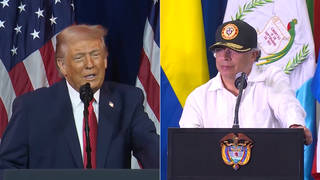

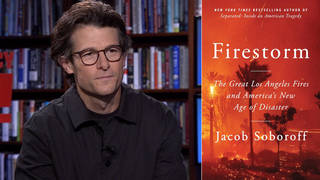
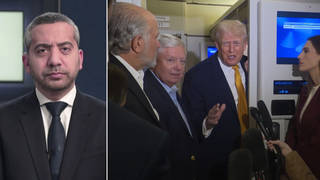

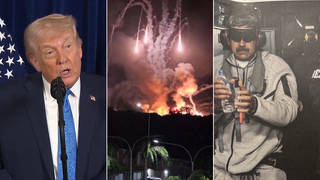
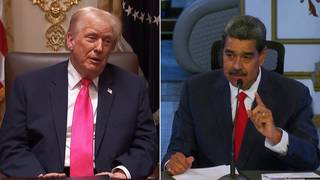




Media Options